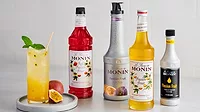Filler technology has required recent innovations, updates to keep up with trends
SKU proliferation, premiumization and sustainability all impacting filler technology

In recent years, there has been a jump in the number of reality dating shows on TV. The ABC Network introduced viewers to programs like “The Bachelor,” “The Bachelorette” and its newer “The Golden Bachelor” and “The Golden Bachelorette” series, which feature older adults looking for love. Now, there are shows such as “Love is Blind,” “Too Hot to Handle” and “Love Island” that have captivated the attention of viewers.
Although no TV crews are involved ― like the proliferation of reality dating shows ― there has been an increase in SKU offerings within the beverage landscape.
Jordan Crawford, product manager, filling and process technology at KHS Inc., Waukesha, Wis., shares how SKU proliferation has impacted filling technology.
“SKU proliferation has accelerated the evolution of filling technology, as shifting consumer preferences — particularly toward health-conscious and alternative adult beverages — demand more flexible, advanced filling systems to accommodate diverse formulations and packaging,” he says.
Given the increasing number of SKUs, filling technology is working to streamline changeover practices.
“We’ve achieved over 50%-time savings within our can filling portfolio thanks to our strong partnerships with Ferrum and the introduction of SmartCan,” Crawford notes. “Recently, we’ve taken another step forward with the acquisition of a majority stake in Tyrolon. Tyrolon’s Star and Neck clamp systems enable gentle, efficient conveying of bottles and other containers, streamlining changeovers.”

Tommaso Tegoni, product manager for filling at Sidel, Octeville sur Mer, France, shares that SKU proliferation has significantly influenced filling technology by increasing the need for greater flexibility, efficiency and adaptability.
“With more container sizes, shapes and beverage types, filling systems must handle frequent changeovers with minimal downtime,” he says. “Advanced automation, modular designs and quick-adjustment mechanisms have become essential to accommodate this diversity.”
Modern fillers must manage various liquid properties, such as carbonated, still and hot-filled beverages, without compromising speed or precision, Tegoni explains.
To stay competitive, Tegoni says manufacturers also are prioritizing sustainability by reducing energy, water and material consumption, which makes filling technology more resource-efficient while meeting evolving market demands.
“Introduced by Sidel, the new EvoFILL PET, a next-generation filler for water and still beverages, enhances sustainability through several key features,” he shares. “The EvoFILL PET’s gentle neck-handling system preserves bottle integrity, enabling the use of lighter PET bottles, which reduces plastic use and lowers carbon emissions during transport. The system’s integration with Sidel’s Evo-ON platform further optimizes operations by monitoring and reducing waste, ensuring greater overall efficiency.”
These combined innovations make EvoFILL PET a more sustainable solution for beverage manufacturers, Tegoni suggests.
KHS’ Crawford notes that retrofitting equipment has become essential to keep pace with sustainability trends.
“As packaging materials lighten, aging infrastructure often struggles to meet current quality standards,” he explains. “Retrofitting existing equipment has become necessary to ensure they stay up-to-date, improving efficiency and supporting sustainability goals.”
Other beverage trends are influencing filler technology as well. Crawford points to the shift from value products to premium beverages, which is driving the need for more versatile filling technology.
“As producers aim to differentiate themselves with premium products, from water to functional sodas, filling lines must be capable of handling diverse formulations and more stringent hygiene standards,” he says.
Meanwhile, Sidel’s Tegoni mentions the significant trend of the rise of variety packs, particularly in North America. Noting data from Mintel, Tegoni shares that, between 2016 and 2020, sales of flavored beverage alcohol variety packs surged by 833%, which he says reflects the “explosive popularity” of hard seltzers.
“Variety pack production presents unique challenges compared to traditional beverage filling,” Tegoni explains. “Manufacturers must manage a more complex production flow, considering factors such as SKU diversity, multiple flavors and formats, available equipment space and the level of automation required. … Because variety packs require combing different finished products into a single pack, manufacturers can choose from different approaches — from fully manual operations to automated repacking lines with WIP (work in progress) storage or an integrated on-the-line ‘mega accumulation’ model.”
In terms of innovations, Tegoni says that Sidel’s EvoFILL PET was launched last year. He describes it as a state-of-the-art filler for water and still beverages that enhances hygiene, sustainability and efficiency while reducing total cost of ownership.
“With a 15% smaller footprint, the space-saving design supports high-speed production of up to 90,000 bottles per house,” Tegoni explains. “The simplified configuration, featuring fewer transfer star wheels and a compact front table, makes EvoFILL PET easier to operate, maintain and clean. The filler’s controlled environment supports flowmeter contactless filling, ensuring product safety and quality while preserving bottle integrity.”
The EvoFILL PET is designed for flexibility and enables quick format changeovers in fewer than five minutes, he adds. It integrates seamlessly with Sidel’s Combi and Super Combi systems.
“With improved accessibility, lower operational costs and up to 99% efficiency, EvoFILL PET delivers high performance and long-term reliability, ensuring a lower total cost of ownership for manufacturers,” Tegoni shares.
KHS’ Crawford, meanwhile, notes the company’s acquisition of a majority stake in Tyrolon helps to strengthen its expertise in PET and glass bottle handling.
“Tyrolon’s advanced bottle conveying technologies — such as the Tyrolon Star and universal neck clamp system — enhance efficiency, flexibility and durability in high-performance filling lines,” he says. “By integrating these innovations, KHS is expanding its portfolio to provide more robust, low-maintenance solutions for beverage producers worldwide.”
Crawford remains optimistic about the future for the filler technology segment of the beverage industry.
“The future of filler technology lies at the intersection of flexibility, automation and sustainability,” he concludes. “With advancements in smart sensors and real-time data monitoring, manufacturers can achieve consistent product quality while minimizing waste.”
Looking for a reprint of this article?
From high-res PDFs to custom plaques, order your copy today!





